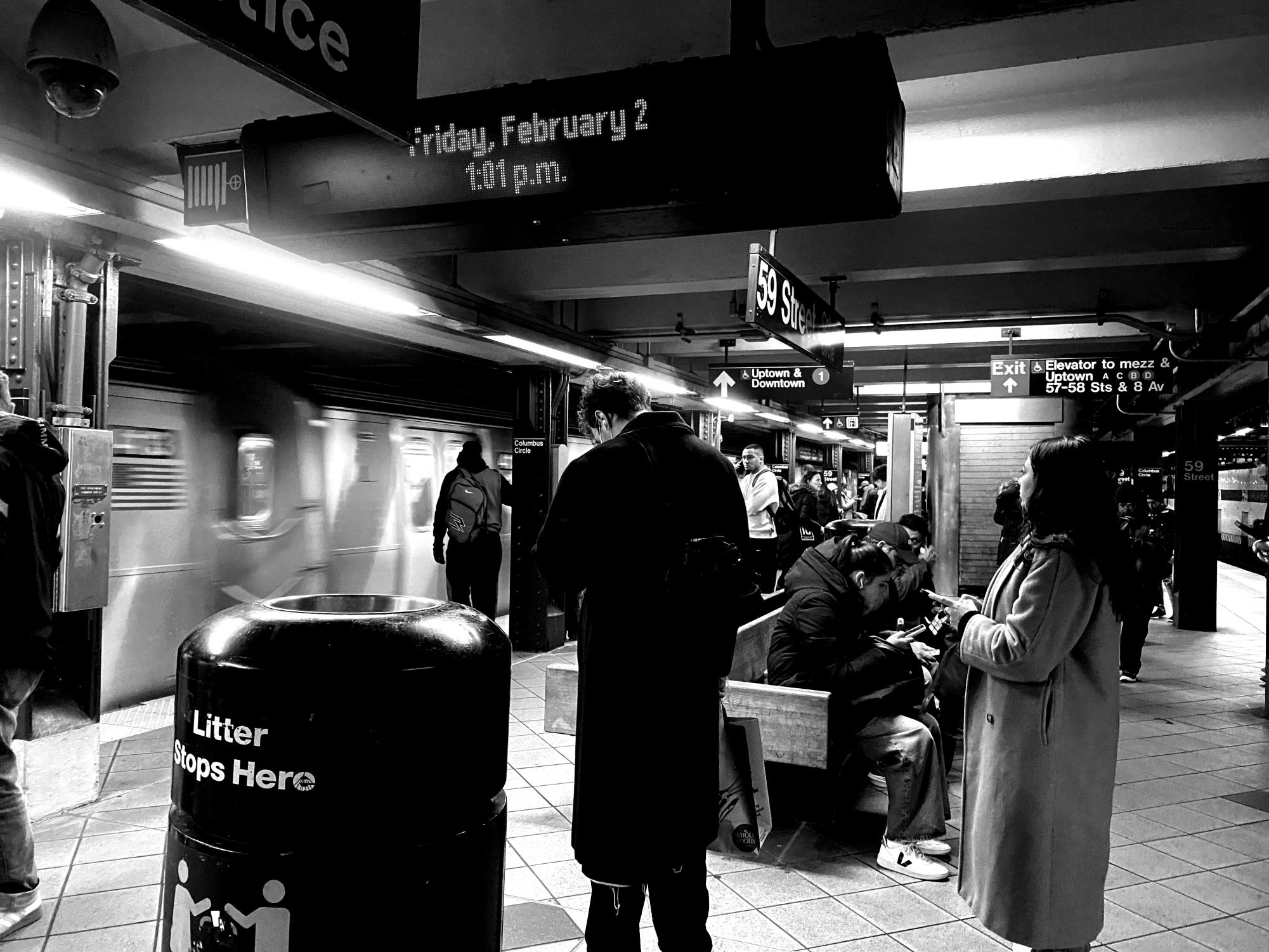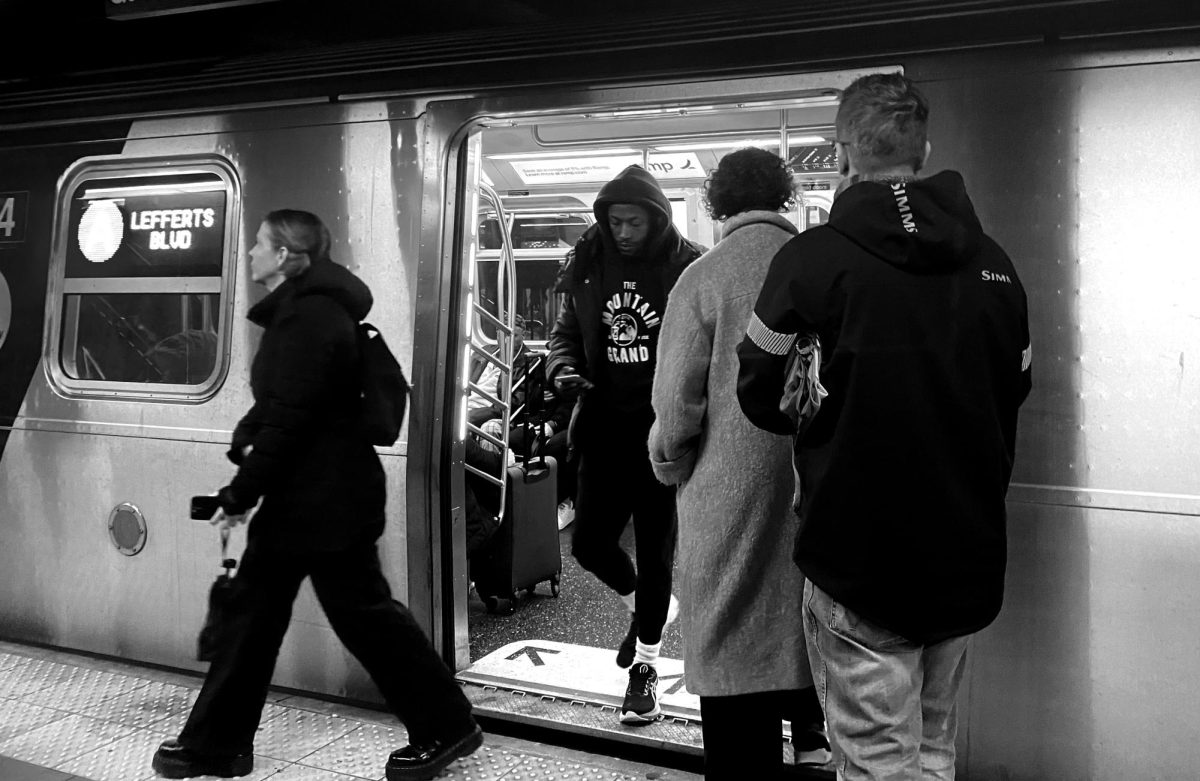Amidst the hustle and bustle of New York City’s morning rush, Francesca Alaimo, Fordham College at Lincoln Center (FCLC) ’25, found herself in an unexpected morning commute on her way to her 10 a.m. class. That morning, Alaimo had left home early after registering for her fall 2023 classes. Her journey to school, typically spanning 45 minutes to an hour, hinged precariously on the whims of the day’s crisis on the N train.
On April 12, 2022, just before 8:30 a.m. — around the time the earliest classes at Fordham classes are taught — a man on a crowded N train in Brooklyn tossed two smoke grenades on the floor of one of the cars and shot at civilians 33 times. The New York Times reported that ten people were shot by gunfire, and 13 people suffered injuries because of smoke inhalation, falls or panic attacks.
Approximately two hours after this shooting had taken place, at 11:33 a.m., Fordham’s Department of Public Safety sent out an email that acknowledged police activity on the R, D and N train lines, which led to service suspension at some stations in Brooklyn and Manhattan. Public Safety suggested that students “consider alternate routes and allow for additional travel time.” Despite the severity of the situation, the university declared that it “remains fully open with all classes in session.”
Alaimo was on the N train at around 9 a.m. and was on track to arrive at her classes by 10 a.m. She recalled when her train suddenly stopped underground between stations for almost an hour. Alaimo was left without phone service, and no one else on the train knew what had just happened in Brooklyn.
Her mother saw the news, conscious of her daughter’s commute, which included the N train. While underground, Alaimo could not answer her mother’s repeated phone calls and texts due to not having service. She said her mother almost had a panic attack at work.
Additionally, Alaimo could not email any of her professors that she would be late to class. By the time she arrived on campus around 11:15 a.m., she had missed her entire class.
For commuter students, which account for approximately half of the Fordham community population at Lincoln Center, the moments leading up to classes can be uncertain because the Metropolitan Transit Authority’s (MTA) system can be unreliable, especially during unpredictable weather and other crises.
Alaimo’s absence that day was counted as unexcused. The alternative route encouraged by Public Safety after Alaimo had already gotten to campus had been to walk to the Queensboro Plaza station and to take the 7 to Times Square, eventually transferring onto the 1 train to 59th Street-Columbus Circle or a twenty-minute walk to the R train to 57th Street and 7th Avenue. This is a longer route than Alaimo’s usual journey on the N train, which is right by her house.
On Sept. 29, 2023, Public Safety sent another cautionary email, this time about inclement weather and campus operations to students after New York Gov.r Kathy Hochul declared a state of emergency in New York City due to heavy rainfall and local flooding. In a press release from the governor’s office, Hochul described the flood as a “dangerous, life-threatening storm,” adding that the “water is deadly.” The university remained on a normal schedule, but advised the Fordham community to “exercise caution while walking on campus, and avoid walking near or under large trees.”
This is a reality for many students at Fordham. For commuter students, which account for approximately half of the Fordham community population at Lincoln Center, the moments leading up to classes can be uncertain because the Metropolitan Transit Authority’s (MTA) system can be unreliable, especially during unpredictable weather and other crises.

Students often allocate two to three hours to navigate the challenges posed by an inconsistent MTA schedule. The situation is exacerbated when New York City experiences unpredictable weather changes or crisis events such as flooding and violence on trains.
Upama Hasan, Gabelli School of Business at Lincoln Center ’26, is a commuter from Jackson Heights, Queens. Hasan described the university’s decision to operate normally to be extremely inconvenient, as transportation from Queens was “minimal and difficult due to the storm.”
She also added that it was “unnecessary” to keep classes in session and that it was “extremely unfair to (commuters) considering that most transportation was not working.” Hasan described residents as having the “luxury” of being unaffected by the storm, and emphasized that the same luxury is not extended to commuter students.
“I was very late to class because I had to find an alternative route,” Hasan said.
Robert Fitzer, associate vice president of Public Safety, said the university’s call to cancel classes during times of emergency is decided on a “case-by-case” basis following consultation with the Emergency Management Team.
Karina Amaach, Fordham College at Lincoln Center ’26, faced similar issues when commuting to class during the Sept. 29 storm. She believes the university’s decision not to shift classes to a virtual modality was upsetting, pointing to the large number of commuters in the student body.
Instead of her usual 40-minute commute from Astoria, Queens to the Lincoln Center campus, it took Amaach an hour and a half because of the delays with the subways and the minimal alternative routes.
Robert Fitzer, associate vice president of Public Safety, said the university’s call to cancel classes during times of emergency is decided on a “case-by-case” basis following consultation with the Emergency Management Team.
“We considered all factors, including class schedules, driving conditions during the affected times, and the availability of public transportation,” he said. “In many instances, we will not cancel classes, and instructors will be directed to consult with their Academic Deans or department heads to make alternative arrangements such as asynchronous learning or remote classes.”
Moving forward, Amaach said that administrators “should be overall more considerate for commuter students, especially during inclement weather.”
Jenifer Campbell, dean of students at Lincoln Center, said the scale of the flood on Sept. 29 “wasn’t forecasted for lack of a better word.”
She added that when there is inclement weather, the Emergency Management Team — which is composed of members from Public Safety, Facilities Management Department, the Office of Information Technology, university chief of staff Michael Trerotola, and other members of the Fordham administration — discuss whether classes should be canceled if the weather affects the ability to connect, causes emergency responses or threatens the life of any student or staff on campus.
On the first day of the spring semester, Jan. 16, Public Safety sent out an email to students that all classes before 10 a.m. were canceled due to a forecast of rain and snow. Buses and trains were delayed because of the weather. Most recently, on Feb. 13, the National Weather Service predicted 5 to 8 inches of snow, high winds, and hazardous road conditions in New York. All in-person classes were canceled, and some professors chose to have online classes.
Moving forward, Amaach said that administrators “should be overall more considerate for commuter students, especially during inclement weather.”
Amaach believes there should also be at least a 12-hour notice prior to the cancellation of class. She recalled the storm in September when she made the hour-and-a-half commute to Fordham only to find out that her class was canceled during her trip. Her other professors also canceled class last minute, leaving her on campus with nothing to stay for.
Similarly, Alaimo noted that “there’s a lack of flexibility of commuters when it comes to crisis. Sending out a safety email is not helpful, but excused absence flexibility when circumstances out of our control come up is more helpful.”
The tales of Fordham’s commuter students underscore what students describe as a need for increased awareness, as well as support for the significant portion of the university community as they grapple with the unpredictable nature of MTA services and external crises.


